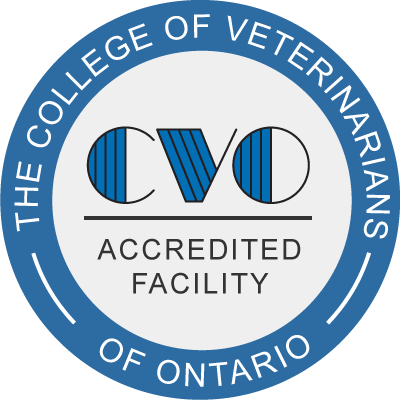Heartworm Disease
Our Philosophy
Although heartworm disease is uncommon in Toronto, it can lead to serious disease and is worth preventing. We see heartworm prevention as extra insurance. For instance we don’t let our dogs (Oscar and Charlie) off leash in any areas that are not fenced in or that are close to traffic, and so the chance of them being hit by a car is very low. However if there was a monthly treatment we could give that ensured they would never be hit by a car, we would definitely use it. Additionally, many current heartworm preventives incorporate protection against gastrointestinal parasites and fleas, which are common in Toronto, and are worth protecting for in their own right.
Heartworm Disease
Heartworms are parasites that are transmitted by mosquitoes, so in Toronto we are only concerned about heartworm disease from late spring to early fall. It is an uncommon parasite in Toronto, and it becomes more common the further south you go, although it is recommended to protect against heartworm disease in northern Ontario as well. Mosquitoes carry the immature larval form of the parasite which is transmitted into the muscle and then bloodstream of a bitten dog. It takes 6-7 months for the immature form of the parasite to mature enough to be able to reproduce and to become large enough to cause disease in the dog. Adult heartworms live in the pulmonary arteries (blood vessels in the lungs) and sometimes the heart of their hosts. Less than 20% of infected dogs show clinical signs of disease (coughing, exercise intolerance or difficulty breathing), however in the small percentage of animals showing clinical signs, the disease can lead to congestive heart failure, coagulation disorders, liver failure and lung disease. Advanced heartworm disease can be fatal.
Prevention
Knowing that mosquitoes are the source of heartworm disease, and knowing the mosquito season in Toronto (May 1st- Nov 1st), we can plan prevention protocols to minimize the risk of dogs ever being infected with the larvae of heartworms by mosquitoes. Common heartworm preventives all have a 4-6 week retroactive action. This means that if a dog was given a preventive on June 1st, the preventive would eliminate all heartworm larvae that the dog was exposed to in the preceding 4-6 weeks. This is why we start heartworm prevention June 1st, 1 month after the beginning of mosquito season, and end on Nov 1st, the end of mosquito season. The preventives do not eliminate adult heartworms.
Testing
A heartworm test is a blood test that is used to detect primarily adult female heartworms. We do the heartworm tests in the spring (May 1st and after) because this gives the larvae that could have infected a dog last summer enough time to mature and be detectable by the test. The heartworm test result is proportional to the amount of worms present, the more worms the stronger the positive result, and large numbers of male adults could result in a positive result. If the test is negative, it means there are no female adult worms present and that if there are male adults present, there are very few of them. If there are only male worms present, there is no way for them to reproduce and therefore the infection is self limiting. However adult heartworms can live up to seven years, and therefore undetected male adult worms could theoretically lead to disease, this difficulty to detect male adult worms and possible disease resulting from them reinforces the importance of preventive regimens. We recommend yearly heartworm testing in order to detect infections with adult heartworms as soon as possible, so that dogs can be treated before any physical damage by the adult worm can occur. If the heartworm test is negative than we start the preventive treatments.
Treatment
Dogs with positive heartworm tests undergo radiographs of the chest to help us see how far the disease has progressed. After the severity of the disease is determined, and any stabilization required by the dog is done, we will treat the adult worms with 3 injections spread out over a month. We may also want to treat the more immature forms of the heartworm with a preventive product for 3-4 months.
Preventive Products
There are a variety of preventive products, we recommend a topical spot on that protects against heartworm, roundworm, hookworm, whipworm, and all 3 life stages of fleas. However we can provide any preventive product upon request.

